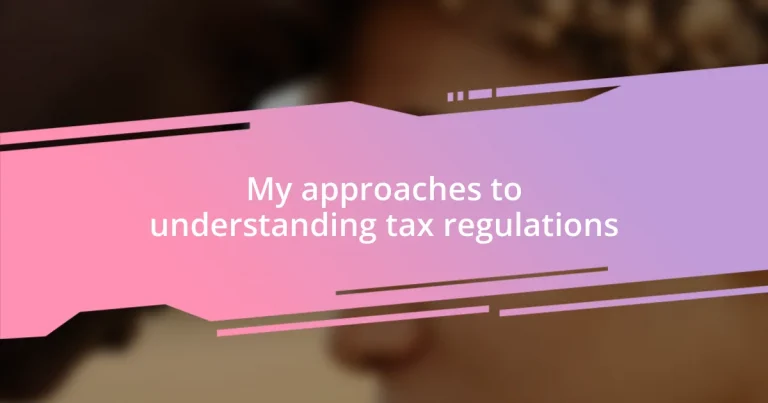Key takeaways:
- Understanding tax regulations is essential for compliance, financial planning, and maximizing deductions, which can prevent costly mistakes.
- Utilizing reliable resources like the IRS website, tax software, and professional advisors enhances knowledge and simplifies tax navigation.
- Staying updated through newsletters, blogs, webinars, and networking reduces anxiety and empowers informed financial decisions.
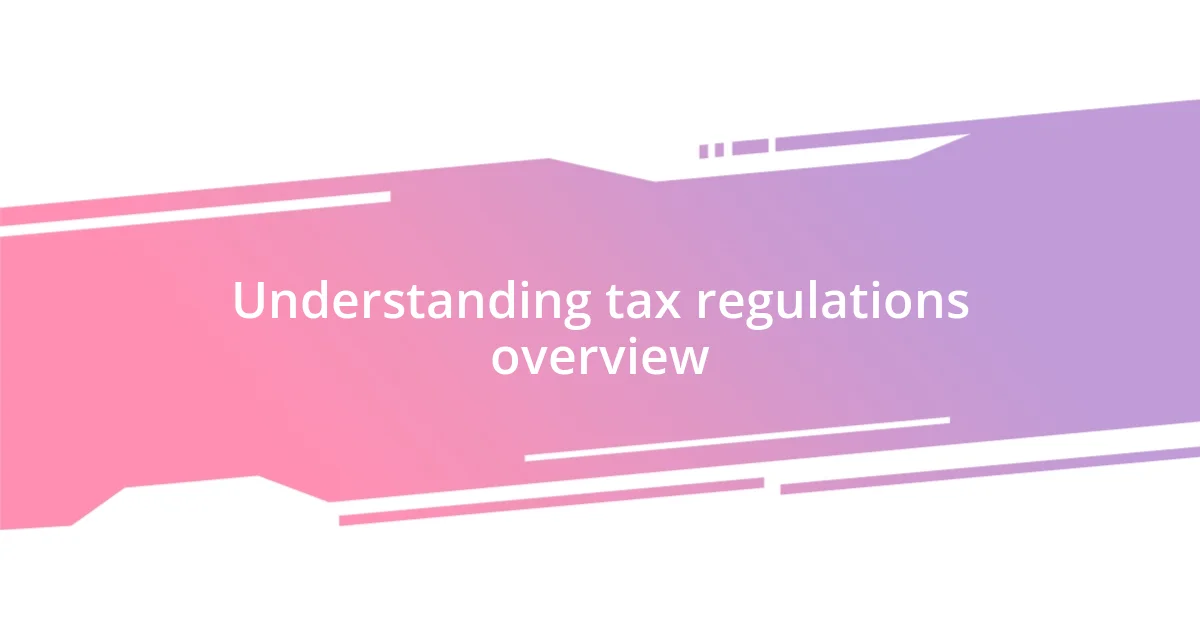
Understanding tax regulations overview
When I first started navigating tax regulations, I was completely overwhelmed. The sheer volume of rules and classifications seemed daunting, and I often wondered how anyone could keep track of it all. But as I delved deeper, I discovered that tax regulations are designed to create structure in the financial landscape, guiding individuals and businesses alike in their obligations and entitlements.
One aspect I’ve found crucial in understanding these regulations is the distinction between different types of taxes—income, sales, property, and so on. Each has its nuances, and I often ask myself, “Am I taking full advantage of the deductions available to me?” Recognizing these differences helped me feel more empowered and less intimidated when preparing my taxes.
It’s also interesting to note that tax laws are not static; they evolve and change. I remember the anxiety I felt when new tax regulations were announced, wondering how they would impact my financial strategy. Staying informed requires consistent effort, but I’ve learned that engaging with recent changes and understanding their implications can turn fear into confidence. It’s this dynamic nature of tax regulations that keeps me on my toes and constantly seeking knowledge.
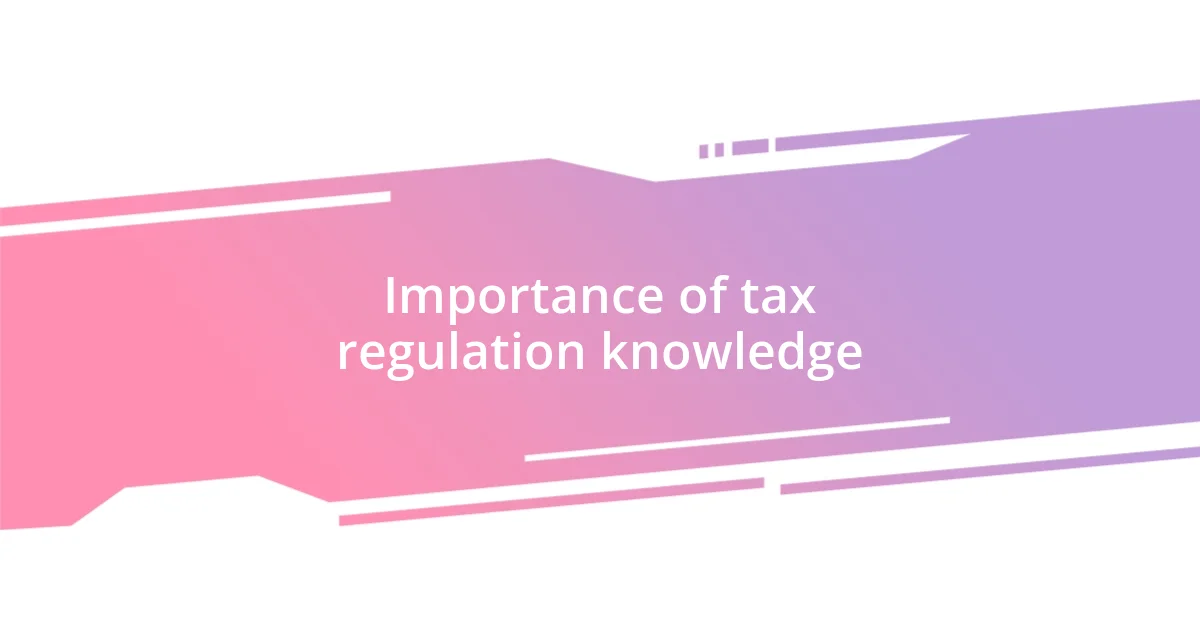
Importance of tax regulation knowledge
Understanding tax regulations is not just essential for compliance—it’s a key factor in making informed financial decisions. I vividly remember a time when I neglected to keep up with tax updates, and it nearly cost me a significant amount of money during tax season. This experience made me realize that having solid tax knowledge can not only help avoid penalties but also maximize potential savings.
Here are a few reasons why staying informed about tax regulations is vital:
- Financial Security: Knowledge of tax rules helps in effective financial planning and reduces the risk of unexpected tax bills.
- Deductions and Credits: Understanding available deductions can lead to substantial savings, allowing for better use of resources.
- Preparing for Changes: Being aware of new regulations means you can adapt your strategies proactively instead of scrambling at the last minute.
- Peace of Mind: Knowing your obligations and rights relieves the anxiety that often comes with tax season, transforming it into a manageable task rather than a source of stress.
Navigating the intricacies of tax regulations can feel like a maze sometimes, yet it’s a journey worth undertaking. Each layer of knowledge peels back another layer of mystery and uncertainty, empowering me to take control of my financial future.
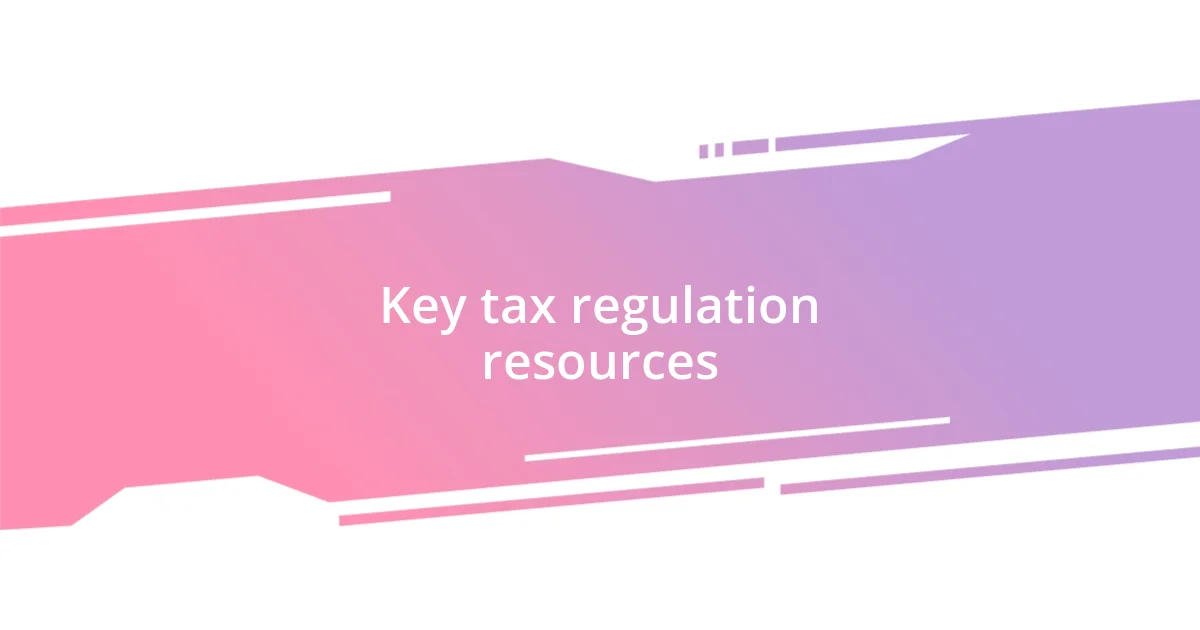
Key tax regulation resources
Understanding where to find reliable tax regulation resources has been key for me. I often turn to the IRS website for up-to-date information and detailed guidance on various tax issues. However, I’ve also discovered that local libraries can be surprisingly helpful, offering access to tax guides and literature that you might not find online.
Trustworthy tax software has become my go-to for navigating my tax obligations efficiently. These programs not only aid in calculations but also offer insights into deductions I might otherwise overlook. I remember my first tax season using software—what a game-changer! The anxiety of paper forms and calculations was replaced with a user-friendly interface that walked me through each step, providing peace of mind that I hadn’t experienced before.
Another valuable resource that I often recommend is tax professionals. Engaging with a certified tax advisor has proven beneficial, especially when I faced complex tax situations. They not only clarify regulations but also help to strategize for the future. My experience working with a tax professional revealed the practical aspect of regulations; they made the concepts tangible and relevant to my finances.
| Resource Type | Pros |
|---|---|
| IRS Website | Comprehensive, official information |
| Local Libraries | Access to printed tax guides and books |
| Tax Software | User-friendly, efficient calculations |
| Tax Professionals | Personalized advice and strategy |
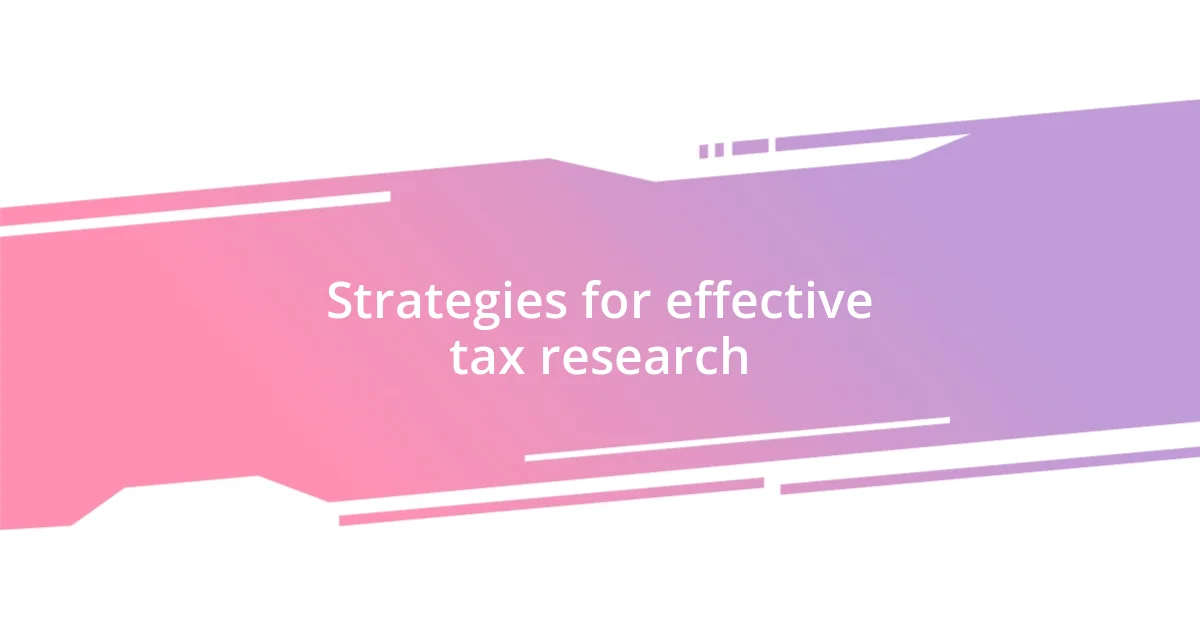
Strategies for effective tax research
Engaging in effective tax research can seem daunting, but I’ve found a systematic approach really pays off. When I dive into a new tax topic, I start by breaking it down into manageable parts. This strategy helps prevent overwhelm. For instance, instead of tackling the entire tax code at once, I focus on one section at a time. This allows me to thoroughly grasp each piece before moving on.
Another technique I recommend is utilizing reliable databases and journals specifically geared towards tax law. I often spend time in tax forums discussing nuanced regulations with fellow enthusiasts. This collaborative approach not only enriches my understanding but also exposes me to perspectives I hadn’t considered. Have you ever wanted to clarify something but found conflicting information everywhere? I’ve been there! Engaging with a community can be a game-changer for sorting through the noise.
Lastly, I can’t stress enough the importance of staying organized during your research. I’ve learned the hard way that jotting down notes and summarizing findings helps solidify what I’ve learned and prepares me for future inquiries. After an exhaustive search on capital gains tax last year, I created a simple spreadsheet that tracks key points and refers back to resources. This not only streamlined my research but made tax season much easier, relieving that tense feeling of uncertainty that normally looms.
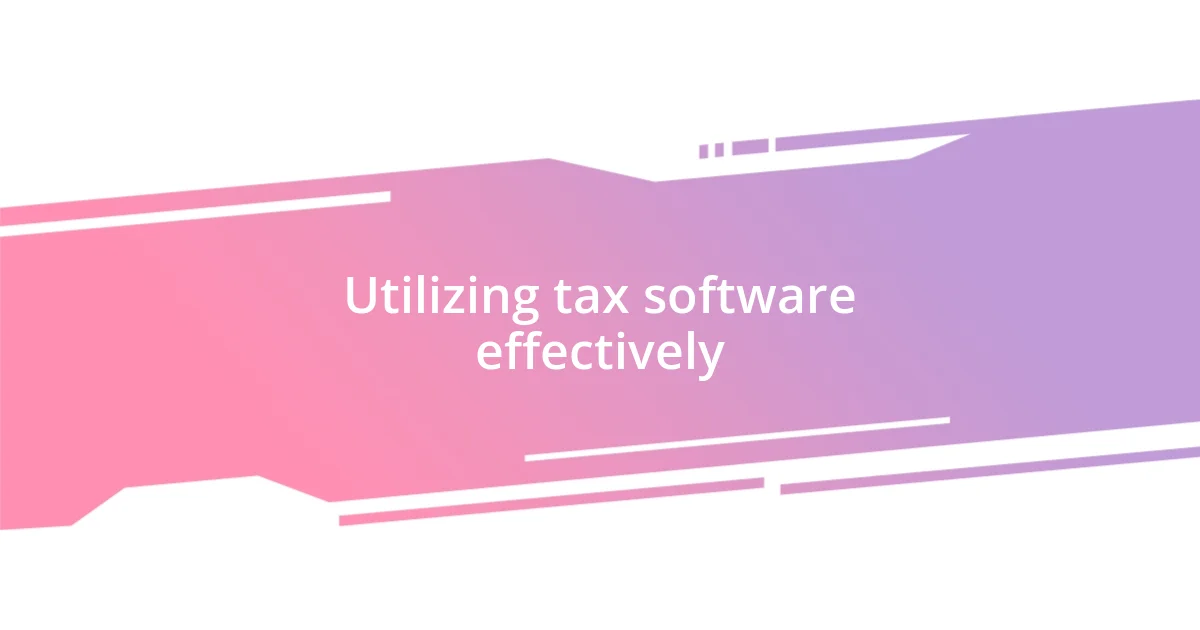
Utilizing tax software effectively
When it comes to effectively utilizing tax software, I can’t stress enough how crucial it is to fully understand the features it offers. Initially, I was hesitant to jump into all the functionalities—like e-filing or tax calculators—thinking they were just bells and whistles. But once I took the time to explore them, I found tools that not only simplified my return but also identified deductions I had missed in the past. Have you ever overlooked a potential deduction simply because you weren’t sure where to look? Trust me, taking that time to familiarize yourself can be a real money-saver.
I remember my experience during a particularly busy tax season when I was juggling multiple sources of income. I had been relying solely on basic tax software, which was helpful, but I felt a bit lost. After hearing about advanced features from a friend, I upgraded to a more robust program that allowed me to import my W-2s and 1099s directly. The relief I felt as I watched those numbers populate automatically was indescribable! This allowed me to focus more on strategy rather than the monotonous data entry.
It’s also essential to keep an eye out for customer support resources that come with your software. When I first encountered a glitch that left me panicking, the live chat feature proved invaluable. I was impressed by how quickly they addressed my concerns, guiding me back on track in minutes. Have you ever felt that sense of dread when something goes wrong? That proactive support can make all the difference, turning a potentially stressful situation into just a small hiccup in your tax journey.
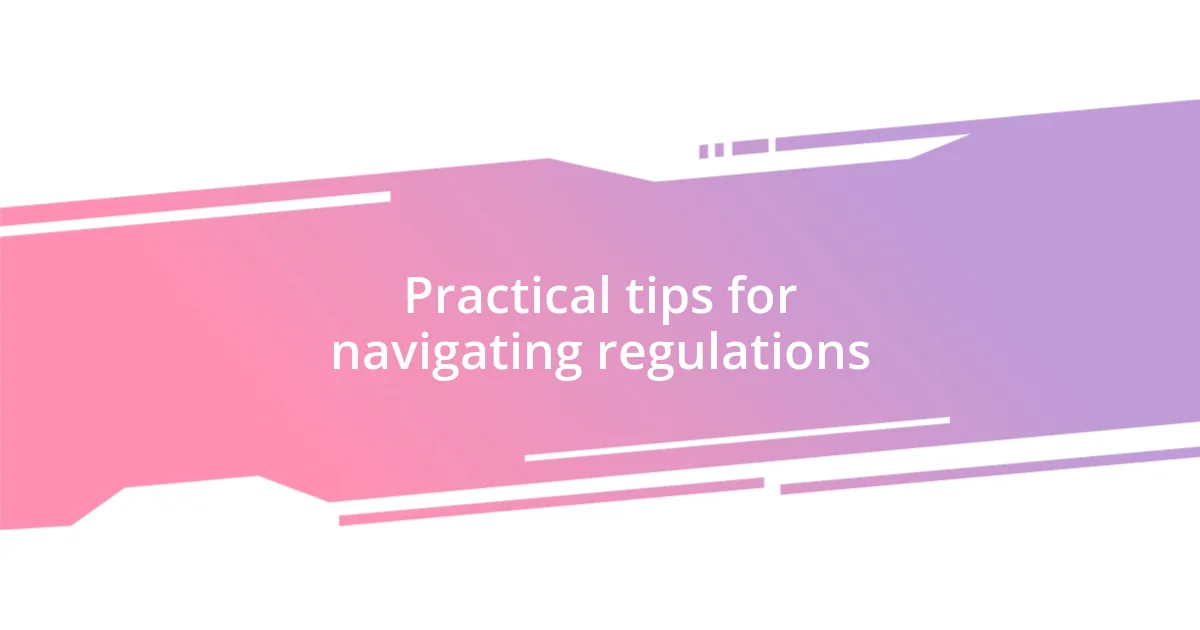
Practical tips for navigating regulations
Staying updated on tax regulations can feel overwhelming, but I’ve found that following a few reliable sources can make all the difference. For instance, I subscribe to newsletters from reputable tax professionals and organizations. This keeps me in the loop about legislative changes and best practices without having to scavenge through countless websites. Have you ever felt lost in a sea of information? A curated source of knowledge can really provide clarity.
Another practical tip I often share is to bookmark resources like the IRS website or state tax agency pages. I remember a time when I needed to find specific filing requirements and, after a quick visit, I discovered straightforward checklists that made the process less intimidating. It’s fascinating how having essential information at your fingertips can ease anxieties. And let’s be honest, who wouldn’t prefer a stress-reducing shortcut?
Finally, don’t underestimate the power of networking. Engaging with local tax groups or attending workshops can expand your understanding of regulations immensely. In my case, I once attended a seminar on recent tax law adjustments, and it was enlightening to discuss these changes with others facing similar challenges. The shared experiences sparked questions I hadn’t even thought to ask. Isn’t it amazing how a little interaction can deepen your insight?
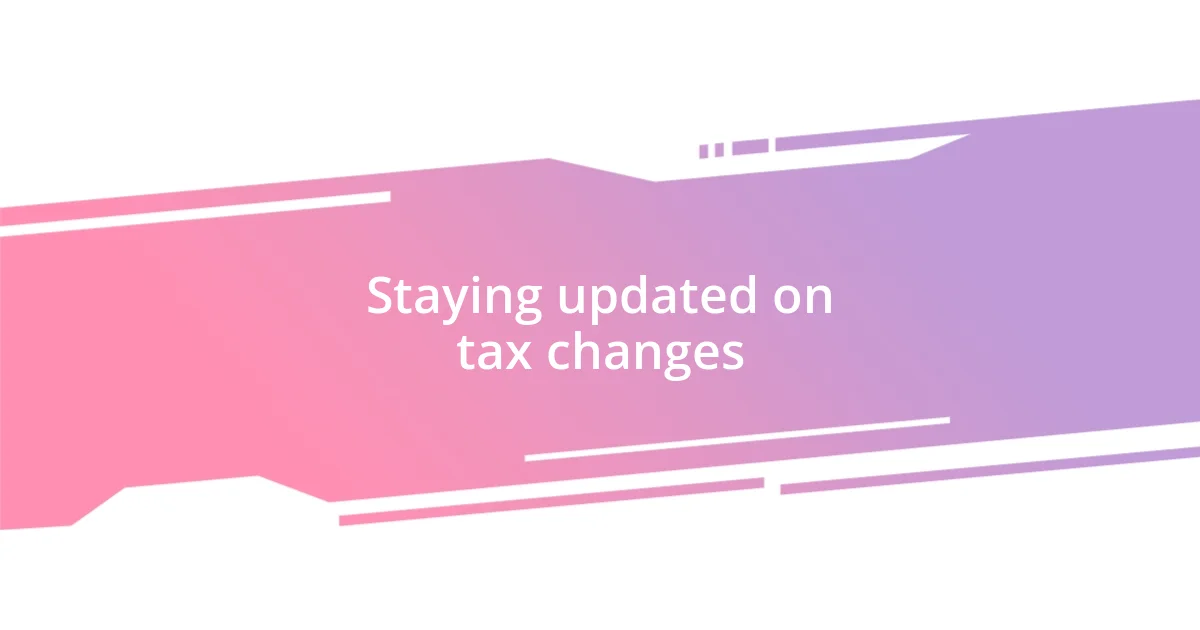
Staying updated on tax changes
Staying updated on tax changes is essential, and I’ve found that following tax blogs can be both informative and enjoyable. One evening, while scrolling through my favorite tax-oriented blog, I stumbled upon an article about significant modifications in capital gains tax. It was like discovering a treasure map! The writer’s engaging style made complex regulations feel accessible, turning what seemed like drudgery into a fascinating read. Have you ever caught yourself learning something new just when you needed it? It’s moments like these that keep me motivated to stay informed.
Attending webinars hosted by tax experts has also become a part of my routine. I recall a particularly dynamic session where a CPA broke down the intricacies of the new deductions introduced that year. I felt a surge of enthusiasm as I grasped how these changes could positively impact my filing strategy. The interactive Q&A allowed me to ask specific questions that directly applied to my situation. Have you ever felt a light bulb moment during a learning experience? Those moments are not just enlightening; they empower me to make smarter financial decisions.
Lastly, I always make it a point to set reminders for important tax dates and updates through my calendar app. I can’t tell you how many times I’ve been saved from last-minute panic by simply having these alerts in place! For instance, I remember almost overlooking an extension for filing state taxes. But thanks to my foresight, I managed to stay on track! Isn’t it comforting to know that a little organization can alleviate stress during these crunch times?












